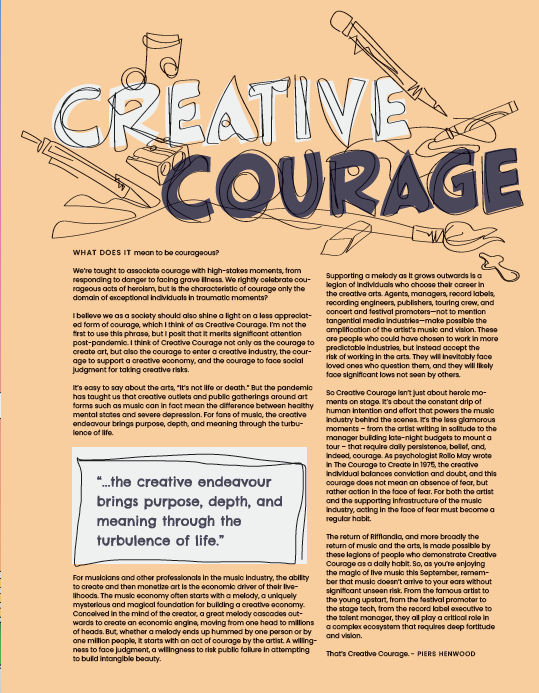Creative Courage
What does it mean to be courageous?
We’re taught to associate courage with high-stakes moments, from responding to danger to facing grave illness. We rightly celebrate courageous acts of heroism – but is the characteristic of courage only the domain of exceptional individuals in traumatic moments?
I believe we as a society should also shine a light on a less appreciated form of courage, which I think of as Creative Courage. I’m not the first to use this phrase, but I posit that it merits significant attention post-pandemic. I think of Creative Courage not only as the courage to create art, but also the courage to enter a creative industry, the courage to support a creative economy, and the courage to face social judgment for taking creative risks.
It’s easy to say about the arts, “It’s not life or death.” But the pandemic has taught us that creative outlets and public gatherings around art forms such as music can in fact mean the difference between healthy mental states and severe depression. For fans of music, the creative endeavour brings purpose, depth, and meaning through the turbulence of life.
For musicians and other professionals in the music industry, the ability to create and then monetize art is the economic driver of livelihoods. The music economy often starts with a melody, a uniquely mysterious and magical foundation for building a creative economy. Conceived in the mind of the creator, a great melody cascades outwards to create an economic engine, moving from one head to millions of heads. But, whether a melody ends up hummed by one person or by one million people, it starts with an act of courage by the artist. A willingness to face judgment and a willingness to risk public failure in attempting to build intangible beauty.
Supporting a melody as it grows outwards is a legion of individuals who choose their career in the creative arts. Agents, managers, record labels, recording engineers, publishers, touring crew, and concert and festival promoters — not to mention tangential media industries — make possible the amplification of the artist’s music and vision. These are people who could have chosen to work in more predictable industries, but instead accept the risk of working in the arts. They will inevitably face loved ones who question them, and they will likely face significant lows not seen by others.
So Creative Courage isn’t just about heroic moments on stage. It’s about the constant drip of human intention and effort that powers the music industry behind the scenes. It’s the less glamorous moments – from the artist writing in solitude to the manager building late-night budgets to mount a tour – that require daily persistence, belief, and, indeed, courage. As psychologist Rollo May wrote in The Courage to Create in 1975, the creative individual balances conviction and doubt, and this courage does not mean an absence of fear, but rather action in the face of fear. For both the artist and the supporting infrastructure of the music industry, acting in the face of fear must become a regular habit.
The return of Rifflandia festival, and more broadly the return of music and the arts, is made possible by these legions of people who demonstrate Creative Courage as a daily habit. So, as you’re enjoying the magic of live music again this year, remember that music doesn’t arrive to your ears without significant unseen risk. From the famous artist to the young upstart, from the festival promoter to the stage tech, from the record label executive to the talent manager, they all play a critical role in a complex ecosystem that requires deep fortitude and vision.
That’s Creative Courage.
This essay originally appeared in the 2022 edition of Rifflandia Magazine.

Piers Henwood Newsletter
Join the newsletter to receive the latest updates in your inbox.